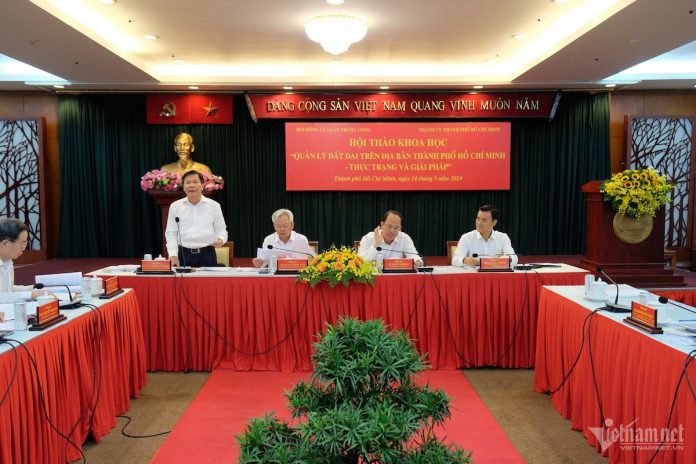Housing in Ho Chi Minh City: A Tale of Both Surplus and Scarcity
On May 14, the Central Theory Council, in collaboration with the Ho Chi Minh City Party Committee, hosted a scientific seminar on “Land Management in Ho Chi Minh City: Reality and Solutions.”
In his opening remarks, Professor Ta Ngoc Tan, Vice Chairman of the Central Theory Council, emphasized the significance of land as a country’s special asset, a fundamental means of production, and the people’s livelihood.

The scientific seminar on land management was held in Ho Chi Minh City on May 14. Photo: Anh Phuong |
Recognizing the importance of land, the Party and State have continuously improved land management and utilization during the renovation process. Land policies and laws have undergone significant innovations, meeting the increasing demands of reality.
However, the reality of national development, in general, and Ho Chi Minh City, in particular, reveals that land use in recent years has been wasteful and inefficient. Corruption and negative incidents have increased. The number of complaints related to land remains high and complex. The real estate market lacks health and sustainability.
According to Professor Ta Ngoc Tan, the seminar aimed to contribute to the implementation of Resolution 18/2022 and the fifth session of the 13th Party Central Committee, as well as the 2024 Land Law.
Speaking about the reality of land management, Mr. Pham Chanh Truc, former Vice Chairman of the Central Economic Committee and former Permanent Vice Secretary of the Ho Chi Minh City Party Committee, shared that while the area is not large, agricultural land in many places is being abandoned, resulting in waste.
Regarding the housing market in Ho Chi Minh City, Mr. Truc stated that it is a source of discontent among the people and a challenge for the state, as real estate businesses dominate the market.
The city currently faces a situation of both surplus and scarcity in housing. According to statistics, there are over 9,400 apartments and 2,500 land plots vacant. However, housing for low-income earners fails to meet the demand.
Data from early 2023 indicates that approximately 244,000 low-income individuals lack housing, and the city plans to construct 30,500 houses. Consequently, if no new demands arise, it will take the city 40 years to address the housing needs of this demographic.

Mr. Pham Chanh Truc, former Vice Chairman of the Central Economic Committee and former Permanent Vice Secretary of the Ho Chi Minh City Party Committee, speaks at the seminar. Photo: Anh Phuong |
Regarding land designated for infrastructure projects in transportation and socio-economic development, Mr. Truc pointed out that compensation for site clearance is a tense issue. It is essential to distinguish between projects that are national, public, or community-serving and those that are commercial to establish a basis for handling them.
In addition to commercial projects involving land use, the former Permanent Vice Secretary of the City Party Committee suggested that the city should consider shifting from land-use right auctions to project-by-project bidding. This would ensure feasibility, reasonable costs, and high-quality construction.
According to statistics from the Department of Natural Resources and Environment of Ho Chi Minh City on land use changes during 2021-2022, the area of agricultural land has decreased year by year, while non-agricultural land has increased. Meanwhile, unused land remains stable at around 1,030.7 hectares. People with rice or perennial crop land tend to switch to residential land.
On land recovery, the Department of Natural Resources and Environment believes that this issue has led to a high number of complaints and lawsuits. The primary cause is that the compensation price is not commensurate with the market price. The most reasonable solution is to compensate and support with the same type of land or land of a different type from the recovered land.
However, this solution has not been implemented due to a lack of provisions in the previous land law. Therefore, Ho Chi Minh City has specified a land recovery procedure by determining the “land value to be compensated as the value before the project implementation.” To achieve this, it is necessary to appraise the land value of the entire project area immediately after the planning is approved.
‘At this rate, the city’s land prices will be on par with Hong Kong’
Speaking at the seminar, Dr. Phung Quoc Hien, former Vice Chairman of the National Assembly, pointed out that Ho Chi Minh City is facing an imbalance in land management. There is a shortage of land funds for transportation, social housing, and industry, especially high-tech, mechanical, and manufacturing industries.
Due to the insufficient allocation of land for these industries, the attraction of capital, particularly foreign direct investment, has slowed down. Moreover, the city has not had any large-scale projects in recent years to create a breakthrough.

Dr. Phung Quoc Hien, former Vice Chairman of the National Assembly. Photo: Anh Phuong |
“Compared to neighboring provinces such as Binh Duong, Dong Nai, Long An, and Ba Ria-Vung Tau, land prices in Ho Chi Minh City are currently too high. This will affect production costs, product and service prices, and reduce investment attraction. If this continues, the city’s land prices will be on par with Hong Kong, China,” said Dr. Phung Quoc Hien, commenting on land prices in Ho Chi Minh City.
Additionally, the issuance of land use right certificates (pink books) to homebuyers in many projects in Ho Chi Minh City is facing obstacles. According to Dr. Phung Quoc Hien, preliminary data shows that more than 58,000 homebuyers in the city have not been granted pink books. As a result, the state has not collected approximately VND 80,000 billion in land use fees from investors. While there are multiple reasons for this, the main one is the delay in land price determination.
At the seminar, experts, scientists, and representatives of state management agencies evaluated the novelties of the 2024 Land Law and proposed solutions to improve land management in Ho Chi Minh City in the future.
Anh Phuong













